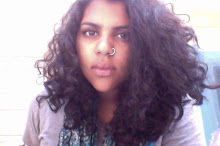 I promise more conquest. I promise debauchery. I promise melodrama. Afterall this is nothing but the aquamarine formula of post-colonialism itself. Summer has begun.
I promise more conquest. I promise debauchery. I promise melodrama. Afterall this is nothing but the aquamarine formula of post-colonialism itself. Summer has begun.Tuesday, May 17, 2011
Summer's Eve
 I promise more conquest. I promise debauchery. I promise melodrama. Afterall this is nothing but the aquamarine formula of post-colonialism itself. Summer has begun.
I promise more conquest. I promise debauchery. I promise melodrama. Afterall this is nothing but the aquamarine formula of post-colonialism itself. Summer has begun.Saturday, May 7, 2011
sitapalum.
Friday, May 6, 2011
Dorthy's Red Ruby Shoes: How I got my Internship
I pressed my hand to the florescent glass. The pulsating amaranthine panel disoriented the golden Mayan mask. Jewels of conquest. My classmates milled around me. I stood perplexed by the odd pairing of modern wall and antiquities. “Let’s go” my impatient roommate poked at me. “Yeah in a bit” I mumbled. The crowd of noisy college students moved past me as I stood, imagining the mask on the face of Laura or Chavelita or Margharita, the Mayan women I was enveloped by in Chiapas whose blood was mapped across the veined glinted ornament. Conquest, post-1492. I stepped back, admiring the purple-gold that made me come face to face to something sensual, salty-sweet, bold, sanguine, tragic. Romance fades, reality intrudes. My fingers glided against the contour of time.
The Smithsonian. 19 museums and galleries, a National Zoological Park, and 9 research facilities. The world’s largest academic institution. Affectionately deemed the nation’s attic, the Smithsonian is my home. My love for museums regresses from my youth. I blame my father for my love. I remember Baba, holding my hand as we entered the homey Carnegie Museum of Natural History. Him in his thick glasses and me in my lace frocks bending over labels: Brachiosaurus altithorax, Tetradenia fruticosa, Peromyscus maniculatus. Every weekend, every holiday, Baba and me. Family of museums. But my adolescent museum days never died away. It was the lonely footsteps against marble that made me feel at home. Baba said I was growing too old for my playground. It was not a time to run any more. It was a time to move to the classroom or the library. But did he not see that pages were unfurling around me while I peered into the delicate crevices of rock spilling quartz? Sometimes I feel that Baba moved to the next exhibit, fascinated by the birds of Paradise as I am still staring at the faces of Hopi women. I am that child who walks in circles, echos from step calling out. Isn’t there someone to lead me back to him? Take me to the front desk? Like a young Octopus vulgaris sealed in alcohol, I waited to be lifted.

After the field trip at the NMAI, I headed for the indigenous cafeteria, nostalgia on my tongue. I ordered two tamales: round and full in my mouth. I cut the pounded corn in half and then resulted into stuffing large helpings between my cheeks. I sighed. I looked up and noticed a handsome Indian woman watching me, her hand on her cheek. She whispered something. The other Indian women she was with turned to me. They in their thick embroidered Calcutta shawls shuffled as I sat up. I crossed my legs, readjusted my skirt, and placed the fork as lady-like as possible, attempting not to look like a ruddy neurotic girl. The handsome woman stood up and walked over to me. “My, what a beautiful Bengali girl! The flower in your hair attracted me to you like bee to fruit”. I blushed. She noticed the flower! (I wear the flower in my constant envious emulation of Frida Kahlo. Young. Organic. Yet strong, sophisticated, timeless.)
“Why are you here at the museum?” I tried to contain myself and speak as eloquently as possible, attempting to choose my words carefully. But then I opened my mouth: “i love indigenous people i lived with them in Chiapas and i wrote an ethnography and i had a family there and we grew corn i loved to pound the corn and wrapped them in husks and bake them under the ground to make tamales...” and so on and so on and so on. I could not stop speaking! Spinning and spinning, I must have talked for five minutes straight. And then I collapsed, all Chiapanecan-ed out.
She raised her eyebrows. Silence.
She pursed her hips and handed me a card. She walked away and placed her hand on my shoulder while whispering “Bye beti”. The two women followed. I stared at the card. My hands grew warm.
I called her the next day, phone pressed to my ear, bare heels clicking together as I waited for her to voice. Pick up. Pick up. Pick up. I left a voicemail.
Hello Ma'am. How are you? My name is Priyanka Srinivasa. I had met you at the American Indian Museum and I am calling you back because you mentioned an internship opportunity. I am calling regarding that internship position. Thank you and I am looking forward to your reply.
I clicked the phone off and I was so proud of the formality of my message. So professional. So avant-guard. I giggled to myself excitedly.
Washington, Here I come.


